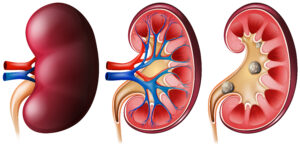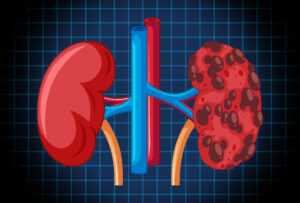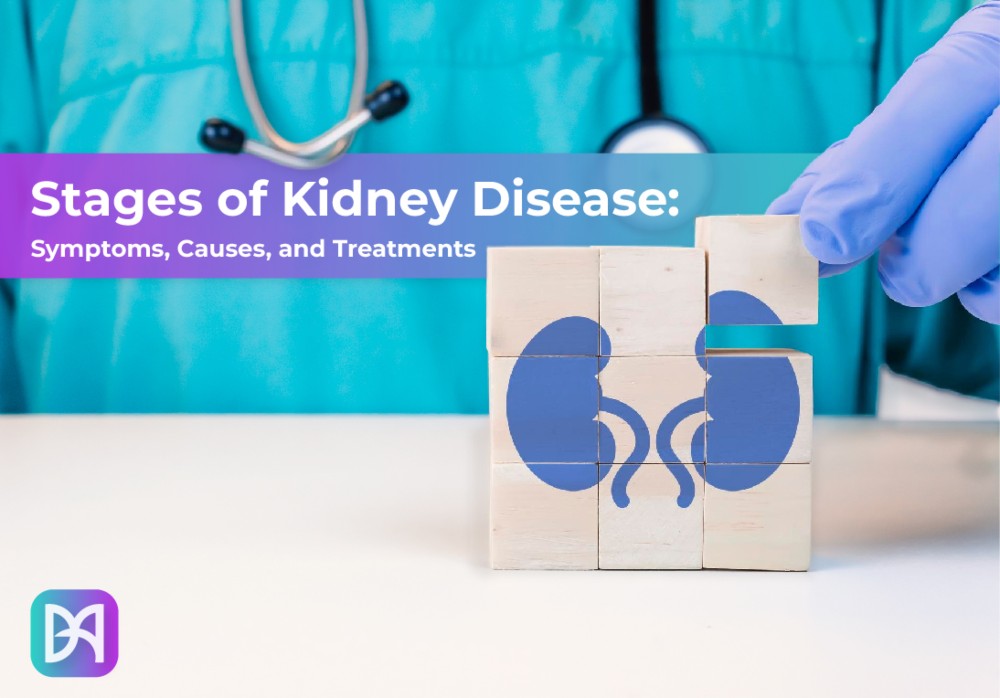Your kidneys are damaged and not functioning as well as they should if you have chronic kidney disease (CKD) or chronic renal failure. The fifth stage, kidney failure, is the last of the four stages of kidney disease.
Table of Contents
ToggleChronic Kidney Disease
Like a filtrate in your body, your kidneys remove excess water, poisons, and waste products from your blood. Aside from that, they also maintain the optimal condition of bones and red blood cells. When kidney function declines, waste builds up in the bloodstream because the kidneys are unable to eradicate it.
Because kidney function gradually declines over time, kidney disease is referred to as “chronic or permanent.” Dialysis, commonly known as end-stage kidney disease, can result from chronic kidney disease (CKD).
Kidney Failure in CKD
Kidney failure may not happen to everyone with CKD, but if therapy is not received, the condition will frequently get worse. Chronic renal illness is incurable. You may, however, take precautions to lessen kidney injury.
Kidney failure, the last after the four Stages of Kidney Disease, can be treated with dialysis or a transplant.
How do our kidneys function?
You are endowed with two kidneys. These organs, which resemble beans, are situated at your back, slightly below your rib cage, on both sides of your spine. Your fist is around the size of each kidney.
Although your kidneys perform a variety of functions, their primary duty is to filter toxins, waste, and extra water from your blood in the form of urine (pee).
In addition, your kidneys create red blood cells, maintain healthy bones, and regulate the levels of minerals and electrolytes (including potassium and salt) in your body. Wastes can accumulate in your blood and cause illness if your kidneys are infected and not functioning properly.
Chronic Kidney Disease Symptoms
You often don’t have any warning signs in the beginning phases. Kidney disease symptoms might include the following as the condition progresses:

- an increased urge to urinate.
- weakness, exhaustion, and poor vitality.
- appetite decline.
- your ankles, feet, and hands swelling.
- frothy or foamy stools.
- puffy eyes.
- Skin that is scratchy and dry.
- difficulty focusing.
- difficulty falling asleep.
- Absence of feeling.
- vomiting or nausea.
- cramping in the muscles.
- elevated blood pressure.
- discoloration of your skin.
Remember that waste can accumulate in your blood for years before kidney disease symptoms manifest.
Different Stages of Kidney Disease
The four stages of kidney disease are listed below. Kidney failure is the common term for the stage that follows. The ability of your kidneys to remove trash from your blood determines which stage you are in. You can find out what stage of the disease you are in using blood and urine testing. Kidney failure to extremely moderate is among the phases.
Stage 1 Kidney Disease
The kidneys are only slightly damaged in stage 1. Because of their high degree of adaptability, they can continue operating at 90% or higher.
At this point, normal tests for blood and urine are likely to accidentally reveal CKD. If you have elevated blood pressure or diabetes, you could also undergo these tests. These are the main reasons for CKD.
Symptoms
Since the kidneys work at 90% or higher in Stage 1 Kidney Disease, there are usually no symptoms.
Treatment
The treatment for stage 1 kidney disease includes the following steps:
- Control your blood sugar if you have diabetic problems.
- Keep up a nutritious, well-balanced diet.
- Avoid using tobacco.
- Make an effort to sleep for 7–8 hours every night.
- Relaxation methods might help you feel less stressed and anxious.
- At least five days a week, spend 30 minutes each day being physically active.
- Make an effort to keep your weight in proportion to your body.
Stage 2 Kidney Disease
The kidneys are operating between 60 to 89% at this point.
Symptoms
You may not have any symptoms even at the stage 2 kidney disease. Or the symptoms are vague and include:
- UTIs (repeated urinary tract infections)

- Elevated blood pressure
- Hand and foot edema
- Pee with blood
Treatment
While there isn’t a cure for stage 2 kidney disease, early intervention and adherence to professional advice can reduce or even reverse the disease’s course.
In addition to managing any illnesses like diabetes, high blood pressure, or cardiovascular conditions, it is critical to treat the root of the issue.
Stage 3 Kidney Disease
There are two more categories, A and B, for stage 3 kidney disease. Your kidney is performing between 45 and 59% when you have stage 3A CKD. The renal function fluctuates from 30 to 44% in stage 3B.
Waste, poisons, and liquids are starting to accumulate because the kidneys aren’t purifying them effectively.
As per the NKF, an eGFR blood test is the only method that can identify CKD at this time, which is why patients are usually diagnosed with it at this initial stage.
Symptoms
Not every person exhibits symptoms of Stage 3 Kidney Disease. But you could encounter:
- Back pain
- Persistent itching
- Loss of appetite
- Fatigue
- Sleep problems
- Weakness
- An increase in hand and foot swelling
- Greater or lesser than normal urination
Treatment
A medical practitioner could advise you to alter your diet, cutting back on salt, calcium, potassium, and phosphorus, for example.
To maintain kidney health, it’s critical to treat underlying illnesses. This might include doing the following:
- Medications to reduce the buildup of fluid.
- Drugs that reduce cholesterol.
- Supplementing with erythropoietin for anemia.
- Drugs for elevated blood pressure, such as barriers of the angiotensin II receptor or ACE inhibitors.
Stage 4 Kidney Disease
You have medium-to-high renal damage if you have stage 4 kidney disease. Because they are only working at a rate of 15–29%, your body may accumulate more waste, contaminants, and fluids.
You must take all necessary precautions at this point to avoid renal failure from developing.
The Organization for Disease Control and Prevention (CDC) estimates that 40% of individuals who have significantly impaired kidney function are unaware that they have it at all.
Symptoms
These include:
- cramping or jerks in the muscles
- nausea or vomiting
- persistent itching
- breathlessness
- sleep issues
- edema in the fingers and feet
- more or less than typical urination
- fragility
- reduction in weight
- back pain
- chest pain
- decreased mental sharpness
- fatigue
- loss of appetite
Treatment
Working closely with medical professionals is crucial in stage 4. If your kidneys fail, you should also start talking about dialysis and kidney transplantation.
Furthermore, stage 4 kidney disease may result in other health issues that need medical attention. For instance, metabolic acidosis is frequently brought on by chronic kidney disease. Physicians may recommend oral bicarbonate substitution treatment based on blood bicarbonate ratios.




